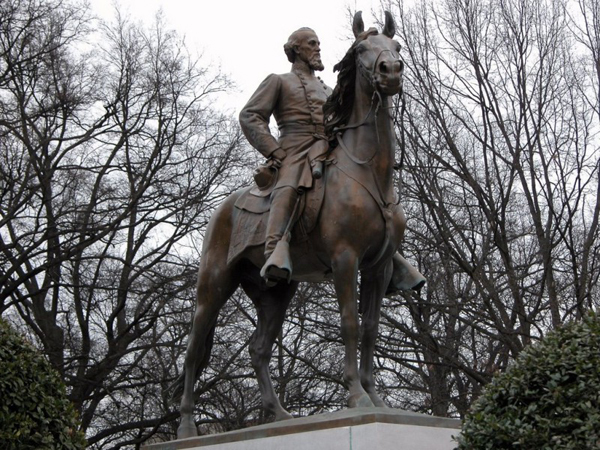
“First they came . . . ” is a poem written by German Lutheran pastor Martin Niemöller. The poem was written in regard to the cowardice of German intellectuals following the Nazis’ rise to power and subsequent purging of their chosen targets, group after group. Many variations of the poem have been written, yet the spirit of the original has been captured in the English language. It speaks to the topic of discrimination, persecution and responsibility:
First they came for the Communists
And I did not speak out
Because I was not a Communist
Then they came for the Socialists
And I did not speak out
Because I was not a Socialist
Then they came for the trade unionists
And I did not speak out
Because I was not a trade unionist
Then they came for the Jews
And I did not speak out
Because I was not a Jew
Then they came for me
And there was no one left
To speak out for me
First they will come for the Confederate flag, then they will come for Confederate monuments, then they will come after the church’s tax-exempt status, then they will come for the few pastors who preach the Gospel. They will charge them with hate crimes if they speak the words written in the Bible. Then they will come for you.
Next they will try and ban the old hymn “Amazing Grace.” The song has been sung by presidents and paupers. The old hymn (often sung by slaves, ironically) was written by former slave ship Captain John Newton. His actions at the end of his life were influenced William Wilberforce, who served in British Parliament. Wilberforce led the campaign to pass the Slavery Abolition Act 1833. There are parallels between John Newton’s old age and Nathan Bedford Forrest. Forrest, like Newton, found redemption at the end of his life, often advocating for African Americans.
What we don’t hear from our “fair and balanced” media is that 3,000 African Americans attended Forrest’s funeral. Can anyone name a white elected official in our great state whose funeral was attended by that many blacks? In 1875 Gen. Forrest spoke to the International Order of the Pole Bearers, a forerunner to the NAACP. I believe it’s a story of redemption that should be told truthfully.
The Independent Order of Pole Bearers, an early black civil rights organization in Memphis, invited Forrest to address its Fourth of July barbecue. Forrest was told by many whites that he should not accept, but Forrest went. Just before he spoke he was presented a bouquet of flowers by Miss Flora Lewis, a daughter of one of the members of the Pole Bearers. Here is Forrest’s speech:
Ladies and Gentlemen, I accept the flowers as a memento of reconciliation between the white and colored races of the Southern states. I accept it more particularly as it comes from a colored lady, for if there is any one on God’s earth who loves the ladies I believe it is myself (immense applause and laughter). I came here with the jeers of some white people, who think that I am doing wrong. I believe I can exert some influence, and do much to assist the people in strengthening fraternal relations, and shall do all in my power to elevate every man, to depress none.
(Applause)
I want to elevate you to take positions in law offices, in stores, on farms, and wherever you are capable of going. I have not said anything about politics today. I don’t propose to say anything about politics.
You have a right to elect whom you please; vote for the man you think best, and I think, when that is done, you and I are freemen. Do as you consider right and honest in electing men for office . . .
I came to meet you as friends, and welcome you to the white people. I want you to come nearer to us. When I can serve you I will do so. We have but one flag, one country; let us stand together. We may differ in color, but not in sentiment. Many things have been said about me which are wrong, and which white and black persons here, who stood by me through the war, can contradict. Go to work, be industrious, live honestly and act truly, and when you are oppressed I’ll come to your relief. I thank you, ladies and gentlemen, for this opportunity you have afforded me to be with you, and to assure you that I am with you in heart and in hand.
The speech was followed by prolonged applause. Forrest thanked Miss Lewis for the bouquet and kissed her on the cheek. This type of familiarity between the races in public was almost unheard of at the time, according to an article for The American Catholic by Donald R. McClarey.
“Forrest’s speech was probably motivated by his desire to become a Christian. As his health faltered and his time on Earth grew short, Forrest sought to make amends for some of his deeds, and I think this speech was part of his attempt,” McClarey continued.
This speech was also the last appearance at a public event by Forrest as a speaker.
The First Amendment provides the only kind of security system that can preserve a free government. Our first amendment is the basic foundation of our Republic and should be cherished by all.
As Irish statesman and Parliament member Edmund Burke stated, “Those who don’t know history are doomed to repeat it.”













